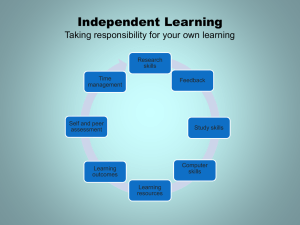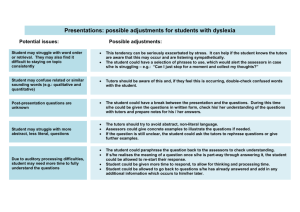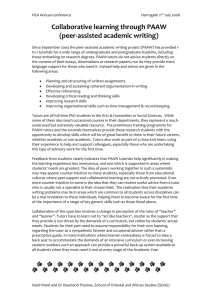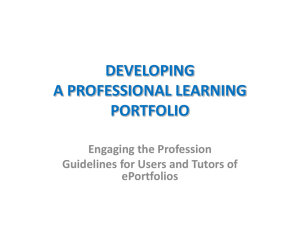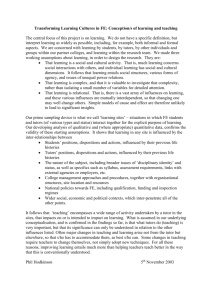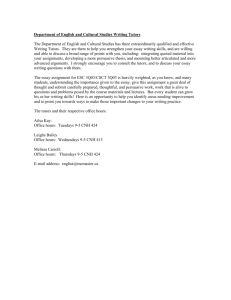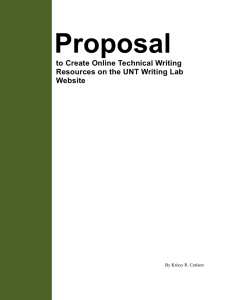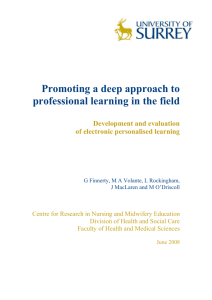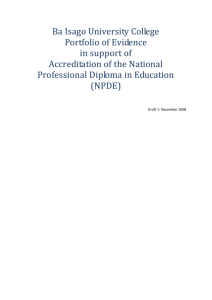Learning `Outcomes` - Will we ever learn?
advertisement
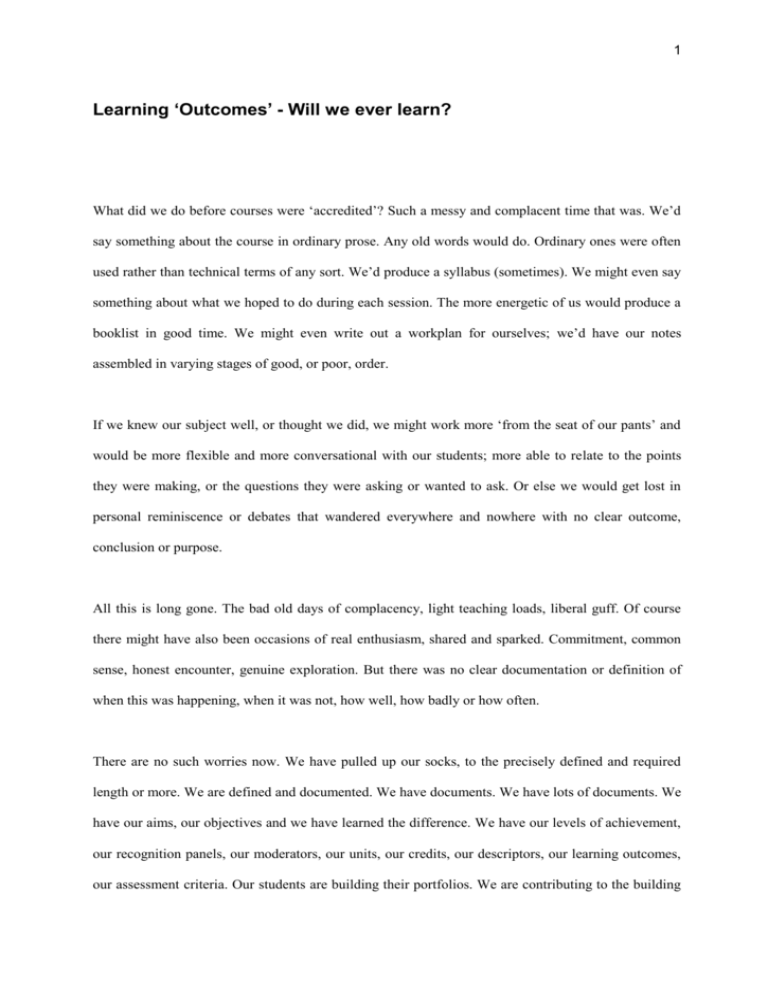
1 Learning ‘Outcomes’ - Will we ever learn? What did we do before courses were ‘accredited’? Such a messy and complacent time that was. We’d say something about the course in ordinary prose. Any old words would do. Ordinary ones were often used rather than technical terms of any sort. We’d produce a syllabus (sometimes). We might even say something about what we hoped to do during each session. The more energetic of us would produce a booklist in good time. We might even write out a workplan for ourselves; we’d have our notes assembled in varying stages of good, or poor, order. If we knew our subject well, or thought we did, we might work more ‘from the seat of our pants’ and would be more flexible and more conversational with our students; more able to relate to the points they were making, or the questions they were asking or wanted to ask. Or else we would get lost in personal reminiscence or debates that wandered everywhere and nowhere with no clear outcome, conclusion or purpose. All this is long gone. The bad old days of complacency, light teaching loads, liberal guff. Of course there might have also been occasions of real enthusiasm, shared and sparked. Commitment, common sense, honest encounter, genuine exploration. But there was no clear documentation or definition of when this was happening, when it was not, how well, how badly or how often. There are no such worries now. We have pulled up our socks, to the precisely defined and required length or more. We are defined and documented. We have documents. We have lots of documents. We have our aims, our objectives and we have learned the difference. We have our levels of achievement, our recognition panels, our moderators, our units, our credits, our descriptors, our learning outcomes, our assessment criteria. Our students are building their portfolios. We are contributing to the building 2 of their portfolio of assessable and assessed, accredited, achievable outcomes of learning, duly levelled and unitised. Their notional learning time is known, to us and to them, for each unit of achievement. They are familiar with the guidance package; they have been duly induced; they are ‘on programme’ and each stage in their progression has been recorded. Their portfolios are expanding and so are ours. All their lives now consist, and will forever consist, in a continuous expansion of individual and organisational portfolio building. The portfolio is for life and is life. It is entirely comprehensive because, if they ever did anything recordable since they were born, but before they were ‘induced’, then we have the mechanisms, guidance packages and care programmes needed to suitably record, monitor, value, celebrate and accredit this prior learning. They know what they must do and when and how. They know what we will do and how. We have listed our methods and the nature of our interaction. Assessment is continuous and is designed to be empowering. So that’s wonderful isn’t it? Of course, units of funding are declining, target class sizes are increasing, personal contact is at a premium and rather rare despite all the talk of guidance and induction. Personal contact is, in any case, rather impersonal since it must be carefully structured within the profiles, the portfolio, the clear outcomes that are required of every unit of activity. Unstructured wandering and wondering? A loose conversation that starts without quite knowing where it is going to go? The staff/student counsellor might be able to slot you in for a brief session of this kind of old fashioned time wasting, but they, too, have their outcomes and unit costs to look after. The old complacent liberal tradition deserved a severe shake up and, in my view, brought it upon itself. There never were any ‘good old days’, or altogether bad old days either, for that matter. Generally, inevitably, it tends to be a mixed picture, but the mixture of good and bad is certainly very different now to what it was, say twenty years ago. 3 We’ve got our outcomes all right. ‘Training’ sets the tempo, the beat, the direction, the standard; ‘education’ looks and sounds like a more dated, suspect, altogether too woolly, concept. At the Leading Edge we are training the trainers; developing and delivering the units. Anything more circumspect, reflective, exploratory, tentative, inclusive, sounds like it might take up too much time, cost too much, and might be suspiciously incapable of delivering the requisite number and quality of outcomes. So far have we moved in this direction that when I find myself sitting on panels discussing the accreditation of the latest course, I look in vain if I try to find a course actually there before me to discuss. I can’t even discover how long the course is actually supposed to be. Those familiar with the accreditation experience will know what I mean. It is not that people presenting the course for accreditation are actually falling down on the job. Far from it. They get better and better in using and understanding the approved terminology. It’s just that the ‘mechanisms’, ‘protocols’ that we all have to use when ‘approving’ a course do not require it, do not request it, do not want it. Let me make that crystal clear to those who don’t know about these things. When approving a course we are not in the business of looking at the course itself. We don’t want to see the workplans, the syllabus, the course materials, the actual theories, specific ideas or practices that the course may include. We are practical people. We want to see results. We want to know what the course will deliver. We want to know what will come out of it and this, apparently, does not require that we know what’s in it. So it’s a complete reversal from the bad old days. In the past, wishy-washy tutors got embroiled with students and weren’t clear about what was going to come out of the session. Now we try to be crystal clear about what is going to come out of it, but enormously vague about what is in it. 4 It might be thought that one extreme of daft behaviour could be counterbalanced by taking daftness to the other end of the spectrum of folly. Or, it might be said that mistakes don’t cancel each other out, but merely multiply. I do think it was a mistake for old style liberal tutors to decide what they were going to do and then, if at all, ask what might be the desired result. But is it not just as stupid to try to specify the results of the course before the course is even written? Here’s a radical suggestion, why not try to design content and consequences at the same time? That way the one might bear a closer working relation with the other. As it stands I am about to be asked, once again, to be a panel member to approve a course, and I know full well that the course is not yet written, or half written. Some education managers are quite happy with this state of affairs; claiming that we only need to specify a framework of outcomes, and then, within this, different tutors can do different things and provide their own styles, preferences and materials, yet all within the agreed framework. In theory this sounds fine. But in practice it gets absurdly difficult, and can be impossible, to talk sensibly about course outcomes without having a course for them to sit on. It’s a bit like describing the Smile without reference to the Cheshire cat to which it belongs. Either we try to get very specific and produce a great long list of possible outcomes. But then the list can get longer and longer, it grows exponentially as the levels of achievement increase. It soon becomes cumbersome and counterproductive, and will everyone achieve all this and should they, and does it make sense to try to specify every possible outcome and, still, how does it connect to any content? Alternatively, we try to be more general when describing the outcomes but then they easily become so broad that they might seriously apply to almost anything. For example, I carried out an analysis of the proposed outcomes of counselling courses to be approved by the counsellor training ‘lead body’, and 5 found that they applied to refuse collection, and any service imaginable, at least as much as to ‘counselling’ of whatever form. All this documentation takes time to read, to write and to approve. One outcome of that, of course, is that people, students, tutors, administrators, have less time to read other, possibly more lucid and worthwhile work. We’re are so busy in developing our Quality Assurance Packages and manically writing and recording everything we do, hope to do, have done, will do, there is not much time to reflect, read, refresh, discuss in a more open ended, open minded, exploratory way. Enthusiasm and curiosity, it might be argued, lie at the heart of real achievement in education. The tutor must feel it. The students’ own must be ignited by the tutor’s if real work and achievement is to occur. But if we are feeling insecure, overworked, surrounded by forms, assignments, busily reading and producing prescribed outcomes, packages and portfolios then what room is left for us to breath? With too little structure and purpose most students will lose, or fail to find, direction and enthusiasm unless they have exceptional drive and ability of their own. But with too much structure we imprison and suffocate both our tutors and our students. In my view we have moved, within less than one generation, from one extreme to the other. Once upon a time tutors could have discussions about syllabuses that had little to do with what students actually did and learned. Now we have created a further tier of nonsense wherein administrators can have discussions about outcomes which don’t even try to connect themselves to the syllabuses that tutors are actually going to use. They will produce “three theories” of this; “three practices of that” but we will say nothing about the nature of the theory and the practice. Thus we can talk for hours about processes and outcomes without saying or seeing anything about content. And you can’t get more hollow than that?

